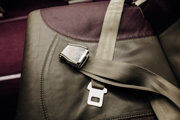Is your data safe? Free wi-fi policy in Aussie airport raises serious privacy concerns
- Replies 4
In today's digital age, the convenience of free public Wi-Fi can be a godsend, especially when you're waiting for a flight and want to check your emails or scroll through social media.
However, the allure of free internet access should come with a word of caution, as a recent controversy at an Aussie airport has highlighted significant privacy concerns that all users should be aware of.
The terms and conditions of Perth Airport's free Wi-Fi service have come under fire for allowing the airport to exploit customer information in any way it pleases.
This revelation has sparked outrage among the public and officials alike, with Liberal MP David Honey labelling the policy ‘an absolute disgrace’ and an invasion of privacy.
The contentious clause in the airport's Wi-Fi policy states that by using the service, users grant the airport a ‘license to use, reproduce, modify, distribute, broadcast, sub-licence and/or otherwise exploit part or all of Your Content in any medium…by any means or for any purpose, and to authorise others to do so’.
The policy also indicates that it may ‘do anything to Your Content which may infringe your moral rights in Your Content, including editing, altering or reproducing Your Content’.

David Honey's reaction to the policy was one of shock and disturbance.
He expressed his concern, stating, ‘The way I read it was if I send a photo of myself or one of my kids or one of my grandkids, that they own the content of it and they could use it for any purpose, they could use it for advertising or perpetuity forever.’
‘It befuddles me why a service provider would have that on their terms and conditions.’
‘This idea that they could take your content and use it for any purpose that they choose, commercial or otherwise, I think is profoundly offensive. I think most people would be absolutely stunned,’ Mr Honey added.
Despite the uproar, a Perth Airport spokesperson has stated that the airport does not use Wi-Fi-related customer content and has no intention of doing so.
‘When Perth Airport provides wi-fi, it is subject to an acceptable use policy set by our internet service provider,’ the spokesperson explained.
‘This requires Perth Airport to ensure that customer content uploaded is not defamatory, offensive or in breach of third-party IP rights.’
‘This term is simply a standard term used across a number of our online services such as our social pages where members of the public do choose to upload or share images with us or enter competitions,’ they continued.
However, the situation has raised broader concerns about the state of privacy laws in Australia.
Digital Rights Watch chair Lizzie O'Shea pointed out that while the terms are alarming, they are not unusual for public Wi-Fi networks.
‘What it highlights is a real deficiency in how personal information is regulated in the digital age and that the privacy laws we have in Australia are not fit for purpose,’ she noted.
Ms O’Shea stated that it placed consumers in a ‘really difficult position’ and highlighted the necessity for legal reform.
She also noted that proposed modifications to federal privacy laws, including a ‘fair and reasonable test’ to assess the collection, use, and sharing of personal information, were under consideration.
Ms O'Shea mentioned that the policy did not clearly indicate that the airport did not plan to use customers' data.
‘That's my concern, that without stronger laws, companies like this are not incentivised to improve the standard form agreements, and so they end up saying one thing [and] doing another,’ she pointed out.
‘That's not really good enough for consumers.’
The incident at Perth Airport serves as a stark reminder of the potential risks associated with using public Wi-Fi networks.
Earlier this year, a Perth man was accused of creating ‘evil twin’ Wi-Fi networks to steal personal details from users at various locations, including airports.
The Australian Federal Police accused Michael Clapsis of using a portable wireless access device to establish free Wi-Fi networks.
When individuals attempted to connect to these networks, they were allegedly redirected to a fraudulent website that prompted them to log in with their email or social media accounts. Police claimed that Mr Clapsis saved their information.
Lizzie O'Shea said she personally does not use public internet networks and advised against using them.
She also raised concerns about children using public Wi-Fi networks, who may not have the capacity to understand or consent to the terms and conditions.
‘I think people should be very cautious about using these not just from a privacy perspective, but also a cyber security perspective,’ she advised.
‘You don't want people taking your information without your consent.
As concerns about data privacy continue to rise, the revelations surrounding Perth Airport's Wi-Fi services have highlighted the potential risks associated with connecting to public networks.
With instances of data harvesting and security breaches becoming more prevalent, it’s crucial for users to remain vigilant.
This situation underscores the importance of understanding how to protect personal information, especially when using Wi-Fi while travelling.
For those who want to safeguard their data while flying, it’s essential to adopt proactive measures to outsmart potential hackers and ensure a safer online experience during air travel.
 Have you encountered any issues when connecting to a public internet network? What is your advice on how to avoid falling victim to cybersecurity attacks when using one? Share your experiences and tips in the comments below!
Have you encountered any issues when connecting to a public internet network? What is your advice on how to avoid falling victim to cybersecurity attacks when using one? Share your experiences and tips in the comments below!
However, the allure of free internet access should come with a word of caution, as a recent controversy at an Aussie airport has highlighted significant privacy concerns that all users should be aware of.
The terms and conditions of Perth Airport's free Wi-Fi service have come under fire for allowing the airport to exploit customer information in any way it pleases.
This revelation has sparked outrage among the public and officials alike, with Liberal MP David Honey labelling the policy ‘an absolute disgrace’ and an invasion of privacy.
The contentious clause in the airport's Wi-Fi policy states that by using the service, users grant the airport a ‘license to use, reproduce, modify, distribute, broadcast, sub-licence and/or otherwise exploit part or all of Your Content in any medium…by any means or for any purpose, and to authorise others to do so’.
The policy also indicates that it may ‘do anything to Your Content which may infringe your moral rights in Your Content, including editing, altering or reproducing Your Content’.

Perth Airport's free Wi-Fi terms permit extensive customer data use, raising privacy concerns. Credit: Facebook / Perth Airport
David Honey's reaction to the policy was one of shock and disturbance.
He expressed his concern, stating, ‘The way I read it was if I send a photo of myself or one of my kids or one of my grandkids, that they own the content of it and they could use it for any purpose, they could use it for advertising or perpetuity forever.’
‘It befuddles me why a service provider would have that on their terms and conditions.’
‘This idea that they could take your content and use it for any purpose that they choose, commercial or otherwise, I think is profoundly offensive. I think most people would be absolutely stunned,’ Mr Honey added.
Despite the uproar, a Perth Airport spokesperson has stated that the airport does not use Wi-Fi-related customer content and has no intention of doing so.
‘When Perth Airport provides wi-fi, it is subject to an acceptable use policy set by our internet service provider,’ the spokesperson explained.
‘This requires Perth Airport to ensure that customer content uploaded is not defamatory, offensive or in breach of third-party IP rights.’
‘This term is simply a standard term used across a number of our online services such as our social pages where members of the public do choose to upload or share images with us or enter competitions,’ they continued.
However, the situation has raised broader concerns about the state of privacy laws in Australia.
Digital Rights Watch chair Lizzie O'Shea pointed out that while the terms are alarming, they are not unusual for public Wi-Fi networks.
‘What it highlights is a real deficiency in how personal information is regulated in the digital age and that the privacy laws we have in Australia are not fit for purpose,’ she noted.
Ms O’Shea stated that it placed consumers in a ‘really difficult position’ and highlighted the necessity for legal reform.
She also noted that proposed modifications to federal privacy laws, including a ‘fair and reasonable test’ to assess the collection, use, and sharing of personal information, were under consideration.
Ms O'Shea mentioned that the policy did not clearly indicate that the airport did not plan to use customers' data.
‘That's my concern, that without stronger laws, companies like this are not incentivised to improve the standard form agreements, and so they end up saying one thing [and] doing another,’ she pointed out.
‘That's not really good enough for consumers.’
The incident at Perth Airport serves as a stark reminder of the potential risks associated with using public Wi-Fi networks.
Earlier this year, a Perth man was accused of creating ‘evil twin’ Wi-Fi networks to steal personal details from users at various locations, including airports.
The Australian Federal Police accused Michael Clapsis of using a portable wireless access device to establish free Wi-Fi networks.
When individuals attempted to connect to these networks, they were allegedly redirected to a fraudulent website that prompted them to log in with their email or social media accounts. Police claimed that Mr Clapsis saved their information.
Lizzie O'Shea said she personally does not use public internet networks and advised against using them.
She also raised concerns about children using public Wi-Fi networks, who may not have the capacity to understand or consent to the terms and conditions.
‘I think people should be very cautious about using these not just from a privacy perspective, but also a cyber security perspective,’ she advised.
‘You don't want people taking your information without your consent.
As concerns about data privacy continue to rise, the revelations surrounding Perth Airport's Wi-Fi services have highlighted the potential risks associated with connecting to public networks.
With instances of data harvesting and security breaches becoming more prevalent, it’s crucial for users to remain vigilant.
This situation underscores the importance of understanding how to protect personal information, especially when using Wi-Fi while travelling.
For those who want to safeguard their data while flying, it’s essential to adopt proactive measures to outsmart potential hackers and ensure a safer online experience during air travel.
Key Takeaways
- Perth Airport's free wi-fi terms allow for extensive use of customer data, which has sparked privacy concerns.
- Liberal MP David Honey and digital rights expert Lizzie O'Shea have both criticised the wi-fi policy as an invasion of privacy and highlighted deficiencies in Australia's privacy laws.
- Perth Airport insists it does not use wi-fi-related customer content and has no intention of doing so.
- The need for law reform is emphasised, as the current privacy laws in Australia are considered not fit for purpose in the digital age.







